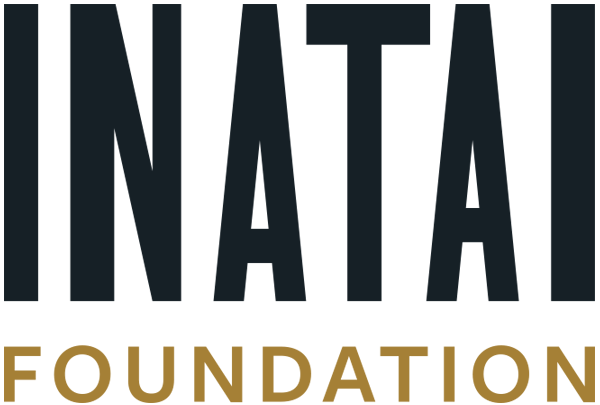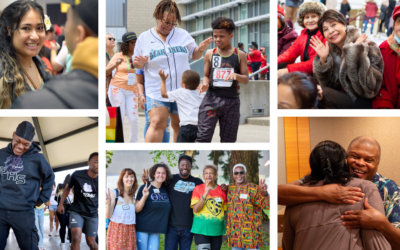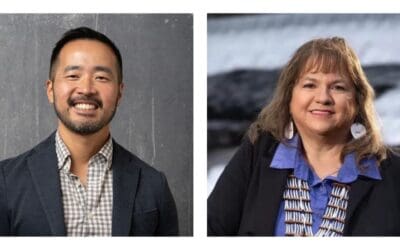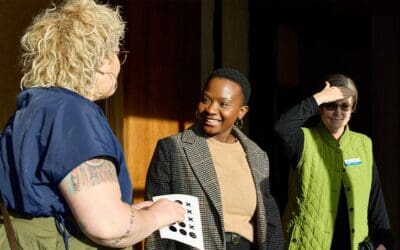Until Feb. 1, 2023, we were Group Health Foundation. This post was written under our former identity. To learn more about our new name, read our announcement here.
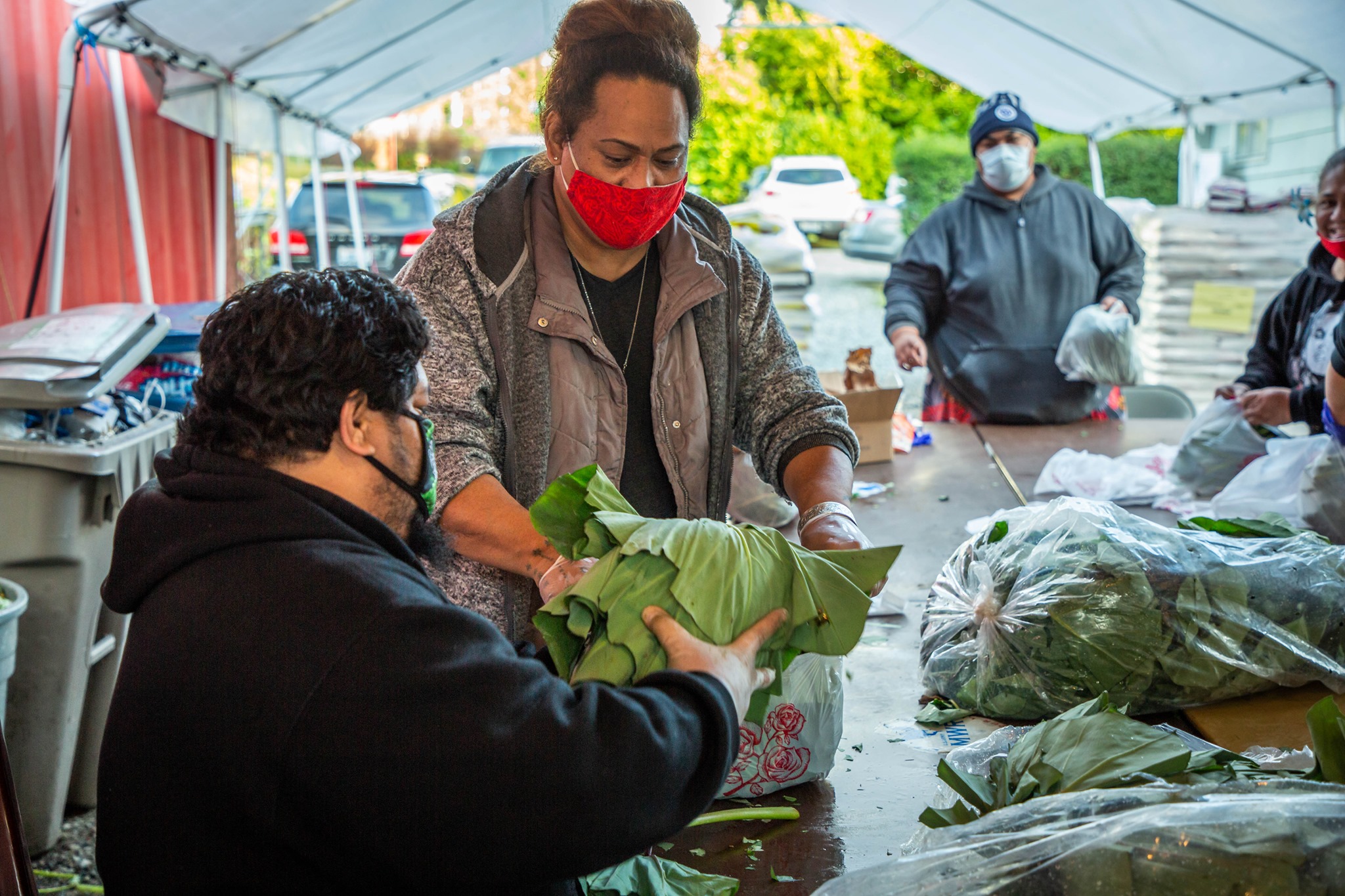
The Equitable Response and Recovery Fund was created early in the pandemic to rapidly deploy emergency funding to community-based organizations throughout Washington. As 2020 wore on and we saw the breadth of the pandemic’s impact, experienced a record-breaking wildfire season, and the movement against anti-Black racism gained greater momentum, the Foundation committed a total of $23 million to these community-led efforts. The 35 organizations we are sharing today received $6 million in the last round of funding.
This fund serves places and communities that have been overlooked by government, medical institutions, and other systems responsible for their health and well-being. In this round, we focused our support on Native and Pacific Islander communities, who are experiencing the highest COVID-19 infection and mortality rates in the state. We also granted to people of color-led nonprofits, culturally specific clinics, tribal nations, grassroots efforts, and work happening in rural areas and smaller municipalities.
In making these grants, we learned that organizations are continuing to serve as powerful advocates for their communities as they respond to immediate needs. The number of roles community organizations take on—as service providers, connectors, information brokers, policy designers, and so much more—is both incredible and unfair. Generations of racism, underinvestment, and privatization have left communities to fend for themselves. As a result, these organizations must stretch their resources to provide aid that should have otherwise come from local, state, or federal government. Despite what they must shoulder, grant recipients remain steadfast in reimagining and fighting for different power structures and systems.
For many organizations, top of mind is equitable distribution of the COVID-19 vaccine as a state report shows white people are getting vaccinated at larger proportions than any other race or ethnicity. To ensure governments and other institutions are practicing their stated values of equity, grant recipients such as the Pacific Islander Community Association, International Community Health Services, and many others have spoken up and taken action for greater accountability.
Grant recipients have also shared they want to be better prepared for the next emergency, including by deepening relationships with partners to build stronger networks of support. This is a goal we, at the Foundation, share. Investing in the organizations that are most important to long-term community rebuilding and recovery is essential to health equity.
When we pulled together the Equitable Response and Recovery Fund last March, we did not know if we were reacting to something that would take weeks or months to control. What we did know was that we needed to get funding quickly to community-based organizations because they are among the first to respond to crises and the last to receive resources.
One year later, we now know that COVID-19’s impacts will reverberate for generations. We also acknowledge that Washington will face other emergencies, including climate disasters and ongoing violence toward our communities. To respond to this moment and be better prepared for the future, the Equitable Response and Recovery Fund will now be part of our grantmaking for at least the next two years. We will continue to improve it over time, including reaching the communities and organizations in Washington we have yet to support.
List of Grantees
Learn about the previous Equitable Response and Recovery recipients here.
For the best viewing experience on your mobile device, please turn it sideways.
| Organization | Description | Service area |
|---|---|---|
| API Chaya | Empowers survivors of gender-based violence and human trafficking to gain safety, connection, and wellness. The organization builds power by educating and mobilizing South Asian, Asian, Pacific Islander, and all immigrant communities to end exploitation. | Seattle |
| Autism Empowerment | Autism Empowerment works in Southwest Washington to enrich and empower young people, adults, and families within the autism community. The organization promotes a culture of autism acceptance throughout its service, support, and activity groups and publications. | Clark County/Southwest Washington |
| Chelan-Douglas Community Action Council | Social service agency based in Wenatchee, providing food, housing, and other services and resources to support residents with low incomes to reach and maintain self-sufficiency. | Chelan and Douglas counties |
| Chelan-Douglas Health District | Health district that is developing Latinx-specific community services with Latinx community leaders. Grassroots models to increase access to care and decrease racial disparities in the region. | North Central Washington |
| Chief Seattle Club | Culturally specific Native organization providing services to families experiencing housing insecurity in Seattle. | Seattle |
| COFA Alliance National Network of Washington (CANN-WA) | Focused on the well-being of residents from the Marshall Islands, Federated States of Micronesia, and Republic of Palau who are living in Washington under a Compact of Free Association—and who are particularly hard-hit by COVID-19. | Statewide |
| Columbia Basin Health Association | CBHA is an anchor provider of health, community connection, and youth and family services in central Washington with strong connections throughout local agricultural community’s working families. | Adams, Franklin, and Grant counties |
| Columbia County Public Health | Health department that extends across several rural southeast Washington counties. In addition to direct services and programs, the agency convenes a regional partnership of healthcare providers, community organizations, and other partners to improve health outcomes for their communities. | Asotin, Garfield, and Columbia counties |
| Community Action Center | Resource center that provides direct support and access to healthy foods in addition to safe, secure housing for families with low incomes living in Whitman County. | Whitman County |
| Confederated Tribes and Bands of the Yakama Nation | Large confederated tribe in southcentral Washington with about 10,000 members occupying a 2.19-million-acre reservation. | Yakima and Klickitat counties |
| Confederated Tribes of the Colville Reservation | Grants funds focus on the Lake Roosevelt Community Health Centers, which are tribally owned and operated rural health clinics in Ferry County that serve the tribal community and the non-Native surrounding community. | Ferry County |
| Country Doctor Community Clinic | Founded by community activists, Country Doctor operates two clinics located in Capitol Hill and the Central District. The Carolyn Downs Family Medical Center is co-located with Odessa Brown Children’s Clinic, which was originally part of the Black Panther medical program. | Seattle |
| Domestic Violence Services of Benton and Franklin Counties (DVSBF) | DVSBF’s mission is to create a healthy community, free from all forms of domestic violence. Services include a 24-hr crisis line, emergency shelter, transitional housing, rental and utility assistance, advocacy for safety planning and legal assistance, counseling, teen dating violence prevention, education and outreach, and more. | Tri-Cities and surrounding Benton and Franklin counties |
| Downtown Pasco Development Authority | Latinx-led local economic development agency, with the long-term goal of seeing the Downtown Pasco area full of life and color. | Pasco |
| Emergency Food Network of Tacoma and Pierce County | Distribution hub for emergency food access in Tacoma and Pierce County. | Pierce County |
| Grays Harbor Public Health and Social Services | Health department that serves a large rural geographic area on the central coast. In addition to direct services and systems change efforts, the agency supports a project founded and led by Latinas to expand services and reduce the stigma that prevents people from reaching out for help. | Grays Harbor County |
| Heritage University | University located on the Yakama Nation reservation and Tri-Cities that serves a primarily Latinx and Native student body in a culturally relevant and supportive environment. Providing food, housing, and support services during the pandemic. | Yakima County |
| International Community Health Services | Asian and Pacific Islander-led community clinic that provides culturally and linguistically appropriate health services to improve the wellness of King County’s diverse people and communities. | King County |
| Kin On Health Care Center | Community-led healthcare organization that honors, supports, and advocates for Asian elders and families in the Puget Sound region by offering culturally and linguistically appropriate health, social, and educational services. | Puget Sound |
| Kitsap Immigrant Assistance Center | Immigrant-serving organization focused on the well-being and empowerment of immigrants through education, direct services, advocacy, referrals, and collaborations. | Kitsap, Mason, Jefferson, and Clallam counties |
| Lhaq’temish Foundation | Multi-faceted Native nonprofit supporting the people of the Lummi Nation. Promotes advocacy, provides social services, and supports community/tribal nonprofit projects and organizations. | Lummi Indian Reservation |
| Native American Youth and Family Center | Providing services to youth, families, and elders throughout Vancouver and Clark County, NAYA’s roots go back generations as a culturally specific community anchor. | Clark County |
| Northwest Indian College | Native-led higher education institution focused on training health care professionals and emphasizing service among rural and medically underserved communities throughout the Northwest. | Located on Lummi Nation and serving all Pacific Northwest tribal communities |
| Pacific Islander Community Association (PICA) | Establishing deep and accountable networks of Pacific Islander communities across the region and ensuring social, political, and physical well-being for families through civic engagement, anti-racist organizing, and advocacy alongside Pacific Islander communities across sectors and issues areas. | Western Washington (King, Pierce, and Snohomish counties), Southwest Washington (Clark and Cowlitz counties), and Eastern Washington (Spokane County) |
| Rural Health Clinic Association of Washington | The clinic is dedicated to maintaining access to health care in rural areas and providing a voice for rural health clinics to citizens, legislators, and government agencies. | Statewide |
| Sea Mar Community Health Centers | Sea Mar’s network of services includes more than 90 medical, dental, and behavioral health clinics and a wide variety of nutritional, social, and educational services, specializing in service to Latino families. | Statewide |
| Seattle Indian Health Board | Culturally specific organization serving the urban Indian community in Seattle with public health services and through direct care. | King County |
| Second Harvest Food Bank | Fighting hunger, feeding hope: Second Harvest brings community resources together to feed people in need through empowerment, education, and partnerships. | Eastern Washington |
| Skokomish Indian Tribe | The Skokomish’s mission is to promote, for present and future generations, an independent, sovereign nation that preserves the traditional values and treaty rights of the Twana people. The Skokomish Tribal Council will provide leadership to create a self-sufficient Skokomish Nation, owned and controlled by members who are grounded in their culture, addiction free, knowledgeable. | Mason County and aboriginal territories of the Skokomish, Twana, Klallam, and Chimakum people. |
| Swinomish Tribe | Federally recognized Indian tribe descended from the Swinomish, Kikiallus, Samish, and Lower Skagit tribes that is currently living on the Swinomish Reservation on Fidalgo Island. | Skagit and San Juan counties |
| Tri Cities Mutual Aid | Tri-Cities Mutual Aid is made up of families and individuals who believe in a need to prepare for an uncertain future, and who pull together resources for families and individuals experiencing economic hardship. | Benton and Franklin counties |
| Ttáwaxt Birth Justice Center | New organization founded and led by Native women who are honoring their ancestors by supporting a healthy birthing community for generations to come. | Yakama tribal community |
| United Territories Of Pacific Islanders Alliance | A Fa’afafine-led organization, UTOPIA provides sacred spaces to strengthen the minds and bodies of Queer and Trans Pacific Islanders (QTPI or “cutie-pie”) through community organizing, community care, civic engagement, and cultural stewardship. | Statewide |
| Washington Gorge Action Programs | Community action agency that provides human service supports to individuals and families living in rural communities across Klickitat and Skamania counties. | Klickitat and Skamania counties |
| Yakima Health District | Yakima County’s local health district, partnering with community organizations to conduct culturally relevant outreach among communities hard-hit by COVID-19. | Yakima County |
| Yakima Valley Farmworkers Clinic | Yakima Valley Farmworkers Clinic is a growing network of clinics and providers who specialize in culturally specific care that centers Latino, rural, and agricultural-worker families. | Statewide |
